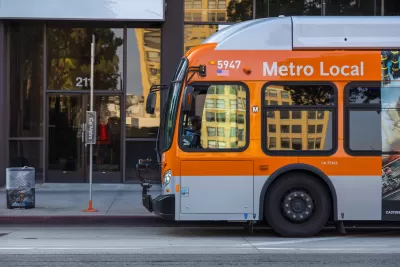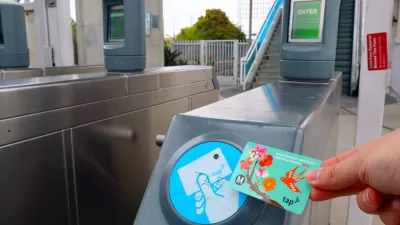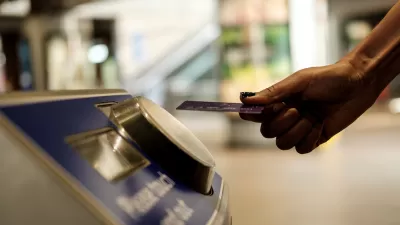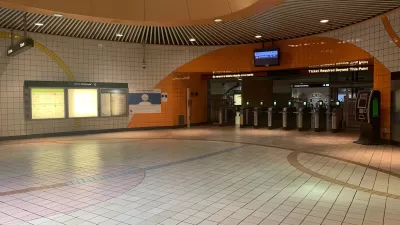Transit fares will be capped at $5 per day for all riders who pay with TAP cards, whether or not they have weekly or monthly passes.

The Los Angeles County Metropolitan Transportation Authority (Metro) is joining other transit agencies that are capping daily fares for pay-as-you-go riders, writes Jared Brey in Governing.
“On July 1, Los Angeles Metro will introduce a new fare policy whereby riders who pay for each ride as they go will pay no more per week than riders who buy an unlimited weekly pass.” This means Metro riders will pay no more than $5 per day or $18 per week.
As Brey explains, “The new policy is designed to address an inequity that persists in many transit agencies, where regular riders who can least afford the upfront cost of weekly or monthly passes end up paying more to ride the subway or bus.”
Over two dozen agencies around the country have implemented fare capping programs since 2017, when Portland became the first U.S. city to adopt one. Unlike programs such as New York City’s, “The weekly counter begins whenever a rider makes their first swipe and runs for seven days, rather than starting over on Monday. That’s part of the agency’s attempts to make a smooth transition to TAP cards for riders who currently pay cash.”
Other changes to Metro’s fare policies include the end of half-price discounts on daily, weekly, and monthly passes and a new flat 75 cent rate for seniors, riders with disabilities, and students.
FULL STORY: L.A. Metro Joins Push for More Equitable Transit Fares

Study: Maui’s Plan to Convert Vacation Rentals to Long-Term Housing Could Cause Nearly $1 Billion Economic Loss
The plan would reduce visitor accommodation by 25,% resulting in 1,900 jobs lost.

North Texas Transit Leaders Tout Benefits of TOD for Growing Region
At a summit focused on transit-oriented development, policymakers discussed how North Texas’ expanded light rail system can serve as a tool for economic growth.

Using Old Oil and Gas Wells for Green Energy Storage
Penn State researchers have found that repurposing abandoned oil and gas wells for geothermal-assisted compressed-air energy storage can boost efficiency, reduce environmental risks, and support clean energy and job transitions.

Private Donations Propel Early Restoration of Palisades Playground
Los Angeles has secured over $1.3 million in private funding to restore the Pacific Palisades playground months ahead of schedule, creating a modern, accessible space that supports community healing after recent wildfires.

From Blight to Benefit: Early Results From California’s Equitable Cleanup Program
The Equitable Community Revitalization Grant (ECRG) program is reshaping brownfield redevelopment by prioritizing projects in low-income and environmental justice communities, emphasizing equity, transparency, and community benefits.

Planting Relief: Tackling Las Vegas Heat One Tree at a Time
Nevada Plants, a Las Vegas-based nonprofit, is combating the city’s extreme urban heat by giving away trees to residents in underserved neighborhoods, promoting shade, sustainability, and community health.
Urban Design for Planners 1: Software Tools
This six-course series explores essential urban design concepts using open source software and equips planners with the tools they need to participate fully in the urban design process.
Planning for Universal Design
Learn the tools for implementing Universal Design in planning regulations.
Ascent Environmental
Borough of Carlisle
Institute for Housing and Urban Development Studies (IHS)
City of Grandview
Harvard GSD Executive Education
Toledo-Lucas County Plan Commissions
Salt Lake City
NYU Wagner Graduate School of Public Service





























